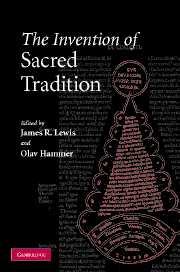Book contents
- Frontmatter
- Contents
- List of figures
- Notes on contributors
- Introduction
- 1 Scientology, scripture, and sacred tradition
- 2 “He may be lying but what he says is true”: the sacred tradition of don Juan as reported by Carlos Castaneda, anthropologist, trickster, guru, allegorist
- 3 The invention of sacred tradition: Mormonism
- 4 Antisemitism, conspiracy culture, Christianity, and Islam: the history and contemporary religious significance of the Protocols of the Learned Elders of Zion
- 5 The invention of a counter-tradition: the case of the North American anti-cult movement
- 6 “Heavenly deception”? Sun Myung Moon and Divine Principle
- 7 “Forgery” in the New Testament
- 8 Three phases of inventing Rosicrucian tradition in the seventeenth century
- 9 A name for all and no one: Zoroaster as a figure of authorization and a screen of ascription
- 10 The peculiar sleep: receiving The Urantia Book
- 11 Ontology of the past and its materialization in Tibetan treasures
- 12 Pseudo-Dionysius: the mediation of sacred traditions
- 13 Spurious attribution in the Hebrew Bible
- 14 Inventing Paganisms: making nature
- Index
- References
13 - Spurious attribution in the Hebrew Bible
Published online by Cambridge University Press: 22 September 2009
- Frontmatter
- Contents
- List of figures
- Notes on contributors
- Introduction
- 1 Scientology, scripture, and sacred tradition
- 2 “He may be lying but what he says is true”: the sacred tradition of don Juan as reported by Carlos Castaneda, anthropologist, trickster, guru, allegorist
- 3 The invention of sacred tradition: Mormonism
- 4 Antisemitism, conspiracy culture, Christianity, and Islam: the history and contemporary religious significance of the Protocols of the Learned Elders of Zion
- 5 The invention of a counter-tradition: the case of the North American anti-cult movement
- 6 “Heavenly deception”? Sun Myung Moon and Divine Principle
- 7 “Forgery” in the New Testament
- 8 Three phases of inventing Rosicrucian tradition in the seventeenth century
- 9 A name for all and no one: Zoroaster as a figure of authorization and a screen of ascription
- 10 The peculiar sleep: receiving The Urantia Book
- 11 Ontology of the past and its materialization in Tibetan treasures
- 12 Pseudo-Dionysius: the mediation of sacred traditions
- 13 Spurious attribution in the Hebrew Bible
- 14 Inventing Paganisms: making nature
- Index
- References
Summary
“Spurious attribution” in the Hebrew Bible is a complex issue. Much of it is retrospective, of course, the result of pious tradition. Indeed, in this respect the Bible as a whole suffers from spurious attribution when referred to, indiscriminately, as the “word of God” or of divine authorship. Some biblical texts explicitly claim to be from God: the law dictated to Moses or oracles to prophets. But these passages are distinguished from their narrative framework as well as from the voice of the recipient until he says, “Thus says the Lord.” For, unlike the Qur'an, the Bible does not claim to consist entirely of divine speech, or to have been entirely dictated.
Spurious attribution within the Bible, with which this chapter mainly deals, is another matter. But in order to understand the nature and implications of the issue, we need first to consider, briefly, the question of “authorship” in its historical and cultural context.
WRITING AND AUTHORSHIP IN THE BIBLICAL WORLD
While the Old Testament (or Hebrew Bible) shares with the New Testament a similar attitude to the distinction (or lack of it) between fact and fiction, it differs over attribution of authorship. Over half of the Old Testament books are not explicitly credited, in whole or in part, to individual authors (i.e. Genesis–Job, Chronicles). This is not unexpected, but follows the scribal culture of the ancient Near East – the territory stretching from Egypt to Mesopotamia, the so-called “Fertile Crescent” – which largely determined the conventions governing the composition and transmission of the Jewish scriptures (composed in Hebrew, with a few chapters in Aramaic).
- Type
- Chapter
- Information
- The Invention of Sacred Tradition , pp. 258 - 276Publisher: Cambridge University PressPrint publication year: 2007
References
- 12
- Cited by



